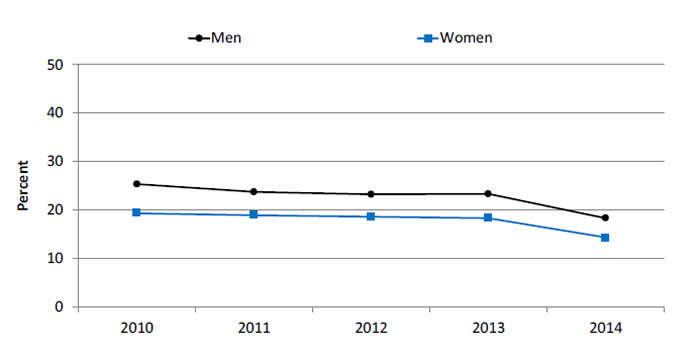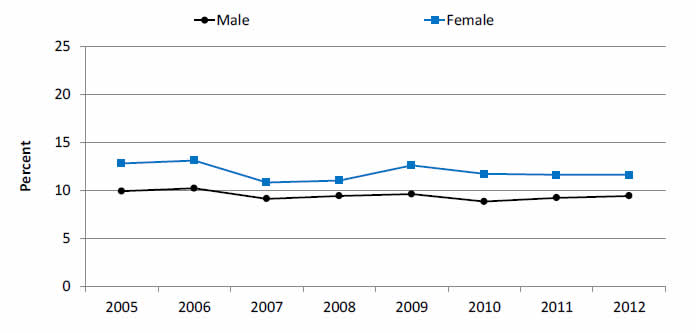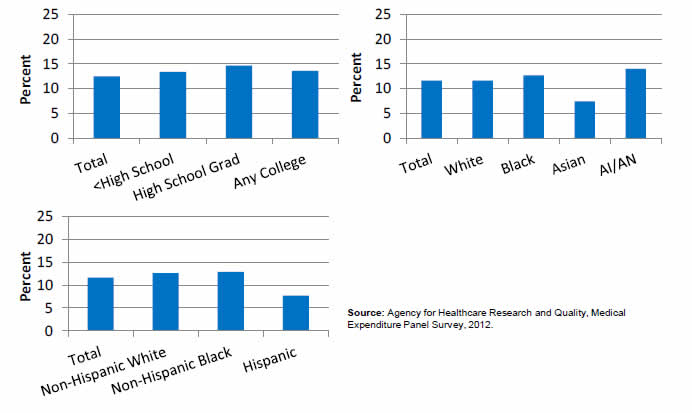Uninsurance
Adults ages 18-64 who were uninsured at time of interview, by sex, January 2010-December 2014

| Year | Men | Women |
|---|---|---|
| 2010 | 25.3 | 19.3 |
| 2011 | 23.7 | 18.9 |
| 2012 | 23.2 | 18.6 |
| 2013 | 23.3 | 18.3 |
| 2014 | 18.3 | 14.3 |
Source: Centers for Disease Control and Prevention, National Center for Health Statistics, National Health Interview Survey, Family Core Component, 2010-2014.
- Importance: Health insurance facilitates entry into the health care system. Uninsured people are less likely to receive medical care and more likely to have poor health status (Healthy People 2020).
- Trends: From 2010 to 2014, the percentage of uninsured adults decreased significantly for both males and females:
- Men: from 25.3% to 18.3%.
- Women: from 19.3% to 14.3%.
- Groups With Disparities:
- In all years, women were more likely than men to be insured at time of interview.
Difficulty Getting Medical Care
People who were unable to get or delayed in getting needed medical care, dental care, or prescription medicines in the last 12 months, by sex, 2005-2012

| Year | Male | Female |
|---|---|---|
| 2005 | 9.9 | 12.8 |
| 2006 | 10.2 | 13.1 |
| 2007 | 9.1 | 10.8 |
| 2008 | 9.4 | 11 |
| 2009 | 9.6 | 12.6 |
| 2010 | 8.8 | 11.7 |
| 2011 | 9.2 | 11.6 |
| 2012 | 9.4 | 11.6 |
Source: Agency for Healthcare Research and Quality, Medical Expenditure Panel Survey, 2005-2012.
- Importance: Lack of timeliness can result in emotional distress, physical harm, and higher treatment costs (Boudreau, et al., 2004). Timely delivery of appropriate care can help reduce mortality and morbidity for chronic conditions, such as kidney disease (Smart & Titus, 2011).
- Trends: From 2005 to 2012, the percentage of people who were unable to get or delayed in getting care decreased from 12.8% to 11.6% for females and from 9.9% to 9.4% for males.
- Groups With Disparities:
- From 2005 to 2012, females were significantly more likely than males to be delayed or unable to get needed medical care, dental care, or prescription medicines in the last 12 months.
Difficulty for Women Getting Care
Women who were unable to get or delayed in getting needed medical care, dental care, or prescription medicines in the last 12 months, by education, race, and ethnicity

Source: Agency for Healthcare Research and Quality, Medical Expenditure Panel Survey, 2012.
- Importance: Lack of timeliness can result in emotional distress, physical harm, and higher treatment costs (Boudreau, et al., 2004) and timely delivery of appropriate care can help reduce mortality and morbidity for chronic conditions, such as kidney disease (Smart & Titus, 2011).
- Groups With Disparities:
- Education: There were no statistically significant differences observed.
- Race: Asian women were significantly less likely than White, Black, and American Indian and Alaska Native women to experience a delay in getting needed medical care, dental care, or prescription medicines in the last 12 months.
- Ethnicity: Hispanic women were significantly less likely than non-Hispanic White and non-Hispanic Black women to experience a delay in getting needed medical care, dental care, or prescription medicines in the last 12 months.



